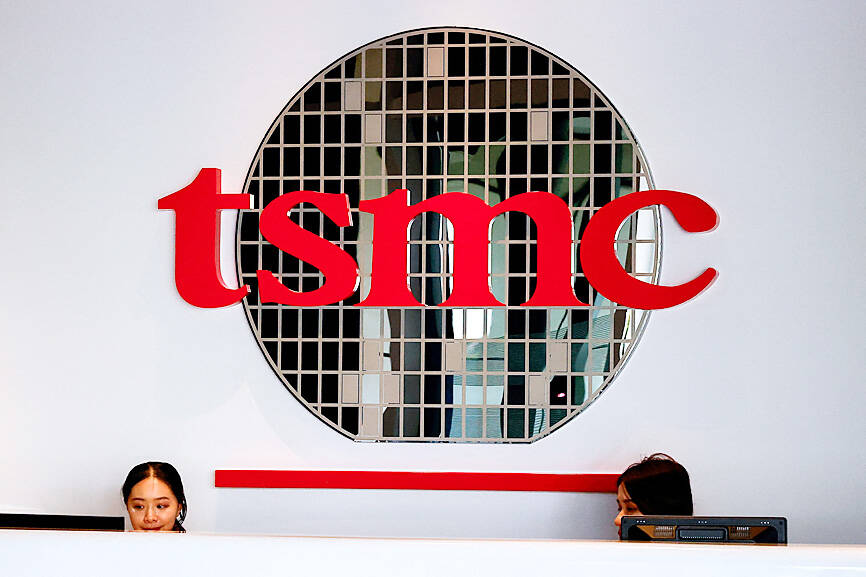Taiwan Semiconductor Manufacturing Co (TSMC, 台積電) listed the challenges of ensuring export control compliance by its customers, months after the company’s artificial intelligence (AI) silicon was found to have flowed to US-sanctioned Huawei Technologies Co (華為) via intermediaries.
“TSMC’s role in the semiconductor supply chain inherently limits its visibility and information available to it regarding the downstream use or user of final products that incorporate semiconductors manufactured by it,” the Hsinchu-based company said in its latest annual report released on Friday.
The world’s largest contract chipmaker said the constraint impedes its ability to prevent unintended end-uses of its semiconductors, as well as diverted shipments by business partners and third parties intent on circumventing sanctions.

Photo: Ann Wang, Reuters
In terms of whether there are going to be compliance issues found, the go-to chipmaker for Apple Inc and Nvidia Corp in the report said there is “no assurance,” despite TSMC’s best efforts to abide by relevant export control regulations.
TSMC provides manufacturing services to many so-called fabless firms and chip designers, including Nvidia. Very often, the semiconductors it customizes for those companies end up being incorporated in gadgets and devices made by third parties, most often for legitimate purposes.
For instance, Qualcomm Inc and MediaTek Inc (聯發科) work with TSMC to make mobile chips used by phone makers, including Xiaomi Corp (小米).
However, an investigation by Canada-based research firm TechInsights last year showed that Huawei’s Ascend 910B AI chip contained semiconductors by TSMC.
The chipmaker halted shipments to a client at about the same time after it found out the semiconductors it made for the customer ended up with Huawei.
TSMC alluded to the incident in the annual report and said it notified Washington and Taipei in October last year that a chip it made for a customer might have been diverted to a restricted entity.
The chipmaker added that it has been cooperating with authorities’ requests for additional information and documents.
US President Donald Trump’s administration has followed the footsteps of former US president Joe Biden in curbing the flow of advanced technologies to China out of national security concerns.
The US earlier this month unveiled a fresh round of regulations to tighten China’s access to advanced AI chips.
Earlier this year, Washington called for chip producers like TSMC and Samsung Electronics Co to step up their scrutiny and due diligence of customers, especially Chinese firms. US officials simultaneously blacklisted 16 Chinese companies including Sophgo Technologies Ltd (算能科技), which was allegedly involved in Huawei getting access to TSMC chips last year.
Together with Sophgo, the US also added PowerAir Pte Ltd to the entity list after the South China Morning Post reported concerns about the Singapore-based company’s possible involvement in diverting TSMC chips to Huawei.

South Korea’s equity benchmark yesterday crossed a new milestone just a month after surpassing the once-unthinkable 5,000 mark as surging global memory demand powers the country’s biggest chipmakers. The KOSPI advanced as much as 2.6 percent to a record 6,123, with Samsung Electronics Co and SK Hynix Inc each gaining more than 2 percent. With the benchmark now up 45 percent this year, South Korea’s stock market capitalization has also moved past France’s, following last month’s overtaking of Germany’s. Long overlooked by foreign funds, despite being undervalued, South Korean stocks have now emerged as clear winners in the global market. The so-called “artificial intelligence

NEW IDENTITY: Known for its software, India has expanded into hardware, with its semiconductor industry growing from US$38bn in 2023 to US$45bn to US$50bn India on Saturday inaugurated its first semiconductor assembly and test facility, a milestone in the government’s push to reduce dependence on foreign chipmakers and stake a claim in a sector dominated by China. Indian Prime Minister Narendra Modi opened US firm Micron Technology Inc’s semiconductor assembly, test and packaging unit in his home state of Gujarat, hailing the “dawn of a new era” for India’s technology ambitions. “When young Indians look back in the future, they will see this decade as the turning point in our tech future,” Modi told the event, which was broadcast on his YouTube channel. The plant would convert

‘SEISMIC SHIFT’: The researcher forecast there would be about 1.1 billion mobile shipments this year, down from 1.26 billion the prior year and erasing years of gains The global smartphone market is expected to contract 12.9 percent this year due to the unprecedented memorychip shortage, marking “a crisis like no other,” researcher International Data Corp (IDC) said. The new forecast, a dramatic revision down from earlier estimates, gives the latest accounting of the ongoing memory crunch that is affecting every corner of the electronics industry. The demand for advanced memory to power artificial intelligence (AI) tasks has drained global supply until well into next year and jeopardizes the business model of many smartphone makers. IDC forecast about 1.1 billion mobile shipments this year, down from 1.26 billion the prior

People stand in a Pokemon store in Tokyo on Thursday. One of the world highest-grossing franchises is celebrated its 30th anniversary yesterday.